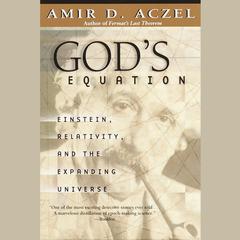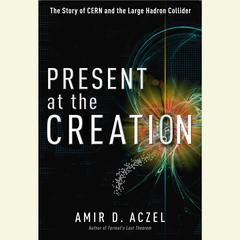 Play Audiobook Sample
Play Audiobook Sample
Mystery of the Aleph (Abridged): Mathematics, the Kabbalah, and the Search for Infinity Audiobook
 Play Audiobook Sample
Play Audiobook Sample
Quick Stats About this Audiobook
Total Audiobook Chapters:
Longest Chapter Length:
Shortest Chapter Length:
Average Chapter Length:
Audiobooks by this Author:
Publisher Description
From the end of the 19th century until his death, one of history's most brilliant mathematicians languished in an asylum. The Mystery of the Aleph tells the story of Georg Cantor (1845-1918), a Russian-born German who created set theory, the concept of infinite numbers, and the "continuum hypothesis," which challenged the very foundations of mathematics. His ideas brought expected denunciation from established corners - he was called a "corruptor of youth" not only for his work in mathematics, but for his larger attempts to meld spirituality and science.
Download and start listening now!
"was a good read although it did not go indepth..."casual" math reading, if you will. i always gravitate towards the mathematics section in the bookstore (math nerd) and this was a good "light" read while i was doped up on vicodin after i got my wisdom teeth out."
— Alison (4 out of 5 stars)
Quotes
-
“Aczel’s compact and fascinating work of mathematical popularization uses the life and work of the German mathematician Georg Cantor (1845–1918) to describe the history of infinity—of human thought about boundlessly large numbers, sequences, and sets.”
— Publishers Weekly -
“Aczel provides a good history leading up to and past Cantor’s work…A brief history of the Kabbalah and highlights of some of its concepts help…[listeners] understand Cantor’s work. The author writes cleanly and clearly on a complex subject, and…[listeners] don’t have to be good at math to enjoy this book. It’s perfect for analytically minded students who love to ponder big questions. Those who enjoyed the popular cosmology books by Stephen Hawking are likely to devour this one as well.”
— School Library Journal
Mystery of the Aleph Listener Reviews
-
" Didn't quite get all of this, but now I understand why ' infinities ' are a problem when the show up ( and the difference between potential and actual infinity ) "
— BAKU, 1/15/2014 -
" A surprisingly quick read! I would have liked a little more in-depth info on all the mathy stuff, but I can understand where that might not have been possible. Interesting stuff. "
— Susan, 1/2/2014 -
" Georg Cantor is worthwhile to learn about; the rest of the book, not so much. "
— Larry, 10/16/2013 -
" Very fun story about the mathematical development of infinity. The introduction to Kabbalah in the beginning was super interesting, I'll have to look into that more deeply. Great mini-biographies of mathematicians associated. "
— Will, 9/16/2013 -
" Impressive, well-researched, easy to follow. Good explanations of the math. "
— Steffi, 3/6/2013 -
" Nice to read some intelligent thoughts on the relation between science and mysticism. "
— Jonny, 3/4/2013 -
" a tour de force through mathematical history. totally accessible to the non-mathematician who also is curious about the history of "infinity" and the people who explored this aspect of mathematics. "
— Maggie, 9/22/2012 -
" a wonderful book about the search for infinity. Historical, entertaining, and most of all, filled with more math than you can shake a stick at. "
— Dale, 4/26/2012 -
" It is Aczel what else needs to be said. This is a good book that is a fun read. "
— Renee, 2/12/2012 -
" This is the third time I've read this book in the last 18 months. It has given me much to ponder on and reflect about in life and our search for the infinite and what that is. "
— Donovan, 7/16/2011 -
" Way to much focus on the compass and no story. I learned a few things but the book was a bit of a drag. "
— Dan, 6/16/2011 -
" Very interesting and easy historical read. "
— A, 2/13/2011 -
" not so much impressed with the depth of the material presented "
— Mohammed, 1/23/2011 -
" quick read - more like a thesis than anything else - but contained some interesting tidbits... "
— Katie, 6/25/2010 -
" Some fairly interesting information about the origin of the magnetic compass and its importance to navigation. Unfortunately, there's not actually a whole book of material here, so the author s-t-r-e-t-c-h-e-d his narrative almost to the breaking point. "
— Stan, 2/25/2010 -
" Somewhat dissapointing narrative of the history of the compass. Not terribly detailed or interesting. "
— Avmacdoug, 12/29/2009 -
" Very good, full of lots of interesting historic facts. The compass is from China! I took some notes. Venice has a lot of interesting history, too. Napoleon took Venice without ever setting foot in it - because they let their Navy die. "
— Caroline, 11/1/2009 -
" some interesting things to pick up in the book - new views and info for me of sea-faring nations and their history. nothing earth-shattering in this but the history is engaging. "
— Phopping, 6/13/2009 -
" This was a great read, describing how the compass was invented and how it changed the world. "
— Elizabeth, 10/25/2008 -
" Not nearly as interesting as I'd hoped. "
— Shannon, 8/26/2008
About Amir D. Aczel
Amir Aczel (1950–2015) earned his PhD in mathematics from UC Berkeley and is the author of the acclaimed Fermat’s Last Theorum, which was published in twenty-two languages. In 2012 he was awarded a Sloan Foundation grant; in 2004 he was awarded the prestigious John Simon Guggenheim Memorial Foundation Fellowship. From 2005 to 2007, Aczel was a visiting scholar at Harvard. He was also a research fellow in the history of science at Boston University. He wrote for Discover magazine online, regularly published in Scientific American as well as science pieces for the New York Times and Wall Street Journal. He often interviewed about science on radio and television, including recent appearances on NPR’s Talk of the Nation’s Science Friday.
About Henry Leyva
Henry Leyva, an Earphones Award-winning narrator, is a classically trained actor with extensive work in theater, television, film, and radio. He has appeared off Broadway and in regional theaters across the country in many plays, including Romeo and Juliet, Taming of the Shrew, and Street Car Named Desire. He has also performed in audio dramas for the Syfy Channel and National Public Radio






























